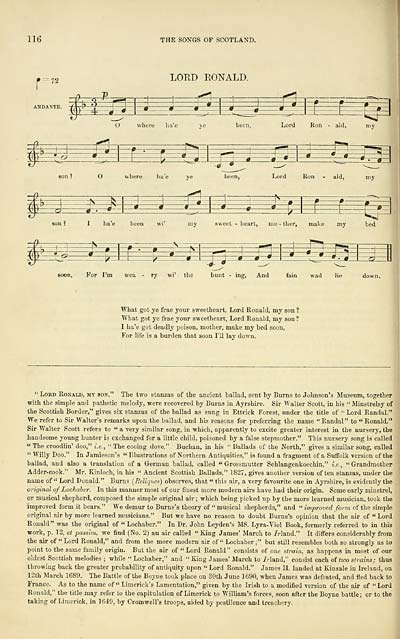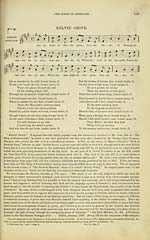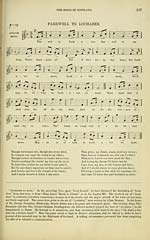Glen Collection of printed music > Printed music > Wood's edition of the songs of Scotland
(140) Page 116 - Lord Ronald
Download files
Complete book:
Individual page:
Thumbnail gallery: Grid view | List view

116
THE SONGS OF SCOTLAND.
^
SEE*E*E
LORD RONALD.
t=3
fe^EEE^
*=££
O where ha'e ve
been,
: C?
Lord Ron - aid, my
-a- * y -^
O where ha'e ye been, Lord Ron - aid, my
^
S
5^
IEE3:
3tz=£
^
I ha'e been wi' my sweet - heart, mo - ther, make my bed
i
=&
PES^ESE
W
-Jt=3t
s
s
*==22:
soon, For I'm wea - ry wi' the hunt - ing, And fain wad lie down.
What got ye frae your sweetheart, Lord Ronald, my son ?
What got ye frae your sweetheart, Lord Ronald, my son ?
I ha'e got deadly poison, mother, make my bed soon,
For life is a burden that soon I'll lay down.
" Lord Ronald, my son." The two stanzas of the ancient ballad, sent by Burns to Johnson's Museum, together
with the simple and pathetic melody, were recovered by Burns in Ayrshire. Sir Walter Scott, in his " Minstrelsy of
the Scottish Border," gives six stanzas of the ballad as sung in Ettrick Forest, under the title of ,; Lord Randal."
We refer to Sir Walter's remarks upon the ballad, and his reasons for preferring the name "Randal" to "Ronald."
Sir Walter Scott refers to " a very similar song, in which, apparently to excite greater interest in the nursery, the
handsome young hunter is exchanged for a little child, poisoned by a false stepmother." This nursery song is called
" The croodlin' doo," i.e., " The cooing dove." Buchan, in his " Ballads of the North," gives a similar song, called
" Willy Doo." In Jamieson's " Illustrations of Northern Antiquities," is found a fragment of a Suffolk version of the
ballad, and also a translation of a German ballad, called " Grossmutter Schlangenkoechin," i.e., " Grandmother
Adder-cook." Mr. Kinloch, in his " Ancient Scottish Ballads," 1827, gives another version often stanzas, under the
name of" Lord Donald." Burns (Reliques) observes, that " this air, a very favourite one in Ayrshire, is evidently the
original of Lochaber. In this manner most of our finest more modern airs have had their origin. Some early minstrel,
or musical shepherd, composed the simple original air ; which being picked up by the more learned musician, took the
improved form it bears." We demur to Burns's theory of " musical shepherds," and " improved form of the simple
original air by more learned musicians." But we have no reason to doubt Burns's opinion that the air of " Lord
Ronald " was the original of " Lochaber." In Dr. John Leyden's MS. Lyra-Viol Book, formerly referred to in this
work, p. 12, et passim, we find (No. 2) an air called " King James' March to /Hand." It differs considerably from
the air of " Lord Ronald," and from the more modern air of " Lochaber ;" but still resembles both so strongly as to
point to the same family origin. But the air of "Lord Ronald" consists of one strain, as happens in most of our
oldest Scottish melodies ; while " Lochaber," and " King James' March to //-land," consist each of too strains; thus
throwing back the greater probability of antiquity upon " Lord Ronald." James II. landed at Kinsale in Ireland, on
12th March 1C89. The Battle of the Boyne took place on 30th June 1690, when James was defeated, and fled back to
France. As to the name of" Limerick's Lamentation," given by the Irish to a modified version of the air of "Lord
Ronald," the title may refer to the capitulation of Limerick to William's forces, soon after the Boyne battle; or to the
taking of Limerick, in 1649, by Cromwell's troops, aided by pestilence and treachery.
THE SONGS OF SCOTLAND.
^
SEE*E*E
LORD RONALD.
t=3
fe^EEE^
*=££
O where ha'e ve
been,
: C?
Lord Ron - aid, my
-a- * y -^
O where ha'e ye been, Lord Ron - aid, my
^
S
5^
IEE3:
3tz=£
^
I ha'e been wi' my sweet - heart, mo - ther, make my bed
i
=&
PES^ESE
W
-Jt=3t
s
s
*==22:
soon, For I'm wea - ry wi' the hunt - ing, And fain wad lie down.
What got ye frae your sweetheart, Lord Ronald, my son ?
What got ye frae your sweetheart, Lord Ronald, my son ?
I ha'e got deadly poison, mother, make my bed soon,
For life is a burden that soon I'll lay down.
" Lord Ronald, my son." The two stanzas of the ancient ballad, sent by Burns to Johnson's Museum, together
with the simple and pathetic melody, were recovered by Burns in Ayrshire. Sir Walter Scott, in his " Minstrelsy of
the Scottish Border," gives six stanzas of the ballad as sung in Ettrick Forest, under the title of ,; Lord Randal."
We refer to Sir Walter's remarks upon the ballad, and his reasons for preferring the name "Randal" to "Ronald."
Sir Walter Scott refers to " a very similar song, in which, apparently to excite greater interest in the nursery, the
handsome young hunter is exchanged for a little child, poisoned by a false stepmother." This nursery song is called
" The croodlin' doo," i.e., " The cooing dove." Buchan, in his " Ballads of the North," gives a similar song, called
" Willy Doo." In Jamieson's " Illustrations of Northern Antiquities," is found a fragment of a Suffolk version of the
ballad, and also a translation of a German ballad, called " Grossmutter Schlangenkoechin," i.e., " Grandmother
Adder-cook." Mr. Kinloch, in his " Ancient Scottish Ballads," 1827, gives another version often stanzas, under the
name of" Lord Donald." Burns (Reliques) observes, that " this air, a very favourite one in Ayrshire, is evidently the
original of Lochaber. In this manner most of our finest more modern airs have had their origin. Some early minstrel,
or musical shepherd, composed the simple original air ; which being picked up by the more learned musician, took the
improved form it bears." We demur to Burns's theory of " musical shepherds," and " improved form of the simple
original air by more learned musicians." But we have no reason to doubt Burns's opinion that the air of " Lord
Ronald " was the original of " Lochaber." In Dr. John Leyden's MS. Lyra-Viol Book, formerly referred to in this
work, p. 12, et passim, we find (No. 2) an air called " King James' March to /Hand." It differs considerably from
the air of " Lord Ronald," and from the more modern air of " Lochaber ;" but still resembles both so strongly as to
point to the same family origin. But the air of "Lord Ronald" consists of one strain, as happens in most of our
oldest Scottish melodies ; while " Lochaber," and " King James' March to //-land," consist each of too strains; thus
throwing back the greater probability of antiquity upon " Lord Ronald." James II. landed at Kinsale in Ireland, on
12th March 1C89. The Battle of the Boyne took place on 30th June 1690, when James was defeated, and fled back to
France. As to the name of" Limerick's Lamentation," given by the Irish to a modified version of the air of "Lord
Ronald," the title may refer to the capitulation of Limerick to William's forces, soon after the Boyne battle; or to the
taking of Limerick, in 1649, by Cromwell's troops, aided by pestilence and treachery.
Set display mode to: Large image | Transcription
Images and transcriptions on this page, including medium image downloads, may be used under the Creative Commons Attribution 4.0 International Licence unless otherwise stated. ![]()
| Special collections of printed music > Glen Collection of printed music > Printed music > Wood's edition of the songs of Scotland > (140) Page 116 - Lord Ronald |
|---|
| Permanent URL | https://digital.nls.uk/91339423 |
|---|
| Description | Scottish songs and music of the 18th and early 19th centuries, including music for the Highland bagpipe. These are selected items from the collection of John Glen (1833 to 1904). Also includes a few manuscripts, some treatises, and other books on the subject. |
|---|
| Description | The Glen Collection and the Inglis Collection represent mainly 18th and 19th century Scottish music, including Scottish songs. The collections of Berlioz and Verdi collected by bibliographer Cecil Hopkinson contain contemporary and later editions of the works of the two composers Berlioz and Verdi. |
|---|

